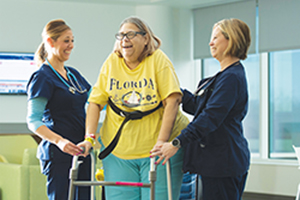Many new programs are targeted to nurses
By JULIE MINDA

Frye
For more than a year beginning in 2017, Cassie Frye, the system manager of benefits and wellness for Hospital Sisters Health System, kept a photo on her desk of the adopted child of an HSHS employee — a child she has never met.
The employee had mailed the photo with a letter to Frye describing the financial hardships of adoption and asking that HSHS add adoption assistance to its menu of benefits. Frye said that as she and her human resources colleagues looked into the possibility of adding adoption assistance, the photo was a reminder that benefit packages are not merely financial incentives — benefits can impact employees' families' lives and their ability to pursue life goals.
Springfield, Ill.-based HSHS added an adoption assistance benefit this year, having confirmed through surveys that many staff members would value the offering. "We truly do care about our colleagues," she said.

Mercy Health of Cincinnati has targeted some of its new or improved benefits specifically to nurses as a way of attracting and retaining more people in this role. Mercy Health is part of Bon Secours Mercy Health.
HSHS is among a sampling of Catholic health care providers who told Catholic Health World that they have been exploring how best to expand their benefit offerings to respond to what current and potential staff value most. Especially in a tight labor market, they said, an attractive benefit package sets an employer apart from the competition and positively affects recruitment and retention. Ministry providers said they are adapting policies on financial assistance for education, and injecting flexibility into work schedules, paid time off and leave policies — all of great value to today's workers and uncommon among health care providers in the markets where they are being introduced.
Financial help
The pressure to stand out is mounting in large part because the nation is experiencing unusually low unemployment and thus a tightening of labor supply. A January Bloomberg News headline said the "Unemployment Rate Reached a Record Low in 19 States Last Year."
A particular and long-standing concern in health care is the tight labor market for nurses, said Allan Calonge, chief human resources strategy and well-being officer for Bon Secours Mercy Health. The Bureau of Labor Statistics projects that health care industry employment will grow 18 percent from 2016 to 2026. Calonge said this growth indicates there will be further increases in demand for nurses.

Mercy of Chesterfield, Mo., offers a paid parental leave benefit to its employees. Lauren Yaktine, manager of operations for a Mercy facility in Branson, Mo., used the benefit for the birth of her daughter. Pictured are Yaktine with husband, Matt Yaktine, daughter Helen Yaktine and son Collier Jones.
Many providers zero in on nurse recruitment and retention when developing new benefits. Both HSHS and Bon Secours Mercy Health recently began offering student loan repayment programs for nurses working full-time. Both health systems will pay monthly stipends to reduce nurses' education loans, up to a cap amount. Bon Secours Mercy Health will pay up to $20,000 toward loans; HSHS, up to $18,000.
HSHS' Frye and Bon Secours Mercy Health's Calonge said their respective systems introduced the education loan benefit because nurses asked for it. Both systems may expand the benefit beyond full-time nurses down the road. Frye said HSHS is considering offering a prorated benefit education debt reduction benefit to part-time nurses, and people in other hard-to-fill positions.
The Chesterfield, Mo.-based Mercy system offers education debt relief to all its employees, through discounted rates on student loan consolidation (Mercy offers the discounted rates through a partnership with the finance company SoFi. Mercy does not refinance the debt.) Both the Missouri-based Mercy system and Bon Secours Mercy Health also provide financial consultation to help employees determine whether they qualify for federal education loan forgiveness programs available to staff of nonprofits.
Work-life balance
Workers, particularly new parents, have told HR departments they'd like more time to bond with their child.
Last year, Mercy began offering two weeks' paid parental leave to benefit-eligible employees with at least 12 months longevity. The leave must be used as a block within the first 12 weeks following the birth, adoption or foster care placement of a child. LeAnn Harris, Mercy's executive director of benefits and wellness, said the benefit is highly unusual.
Mercy also last year began offering a summer-off option for pediatric nurses in its St. Louis market, a benefit it could expand to workers in other clinical disciplines and to additional markets if the pilot proves successful.
Harris said, "We conduct employee surveys and we act on what employees want, we really listen to them and want to bring them value-added benefits. We want to provide what they need for work-life balance, because that's what they say they're struggling with."
Along these lines, Mercy also is piloting, for all employees in its Oklahoma market, an eldercare and childcare program. For a small co-pay, enrolled workers can get immediate access to elder- or child-care assistance, when their elderly loved one or child is sick. Depending on the situation, the child or elder would either be placed into a slot at an appropriate day care facility, or an in-home provider would tend to their needs at home. This way, the staff members could go to work without having to worry about their sick parent or child.
Showcasing values
Calonge said he thinks that in addition to attractive benefit packages ministry providers have an inherent advantage in recruiting employees. "I think the workforce we're seeing now seems to have a greater call to mission. Folks are looking for more of the intrinsic values.
"The call to mission is powerful for us," he said.
Employees blog their progress
Employees of Hospital Sisters Health System can post about their experiences with the LiveWELL wellness application, on an HSHS blog. Here are some of the reflections employees have offered, lightly edited for length.
 Roger Behnke, technical analyst located in De Pere, Wis., at Prevea, a provider group connected with HSHS
Roger Behnke, technical analyst located in De Pere, Wis., at Prevea, a provider group connected with HSHS
I like the step challenge. It has motivated me to keep working out, keep running and to keep moving. I also like encouraging others. This program keeps me fired up when trying to fire up others. When I first started, my blood work and biometric results were fair at best. I was well into the obese category. I needed this program to give me a little shove in the right direction. When I started in (December 2017) I was 281 pounds, I couldn't run 50 yards, let alone a mile. I am running/walking nearly 10 miles at least once a week and daily running 3.1 miles. I am now down 49 pounds.
 Kathy Jostes, clerical support associate, HSHS St. John's Hospital — Springfield, Ill., at center
Kathy Jostes, clerical support associate, HSHS St. John's Hospital — Springfield, Ill., at center
My favorite challenge is the 10,000 steps. My husband loves hiking, mountain climbing and anything to do with the outdoors. To me it was always very bothersome that he wanted me to go with him and participate. The only hiking I wanted to do involved the closest shopping mall. When I first started LiveWELL it was just to get the discount (on insurance premiums). But now I have more energy and I feel better. Now I am the one who wants to go hiking and mountain climbing. It has brought us closer, not just in our marriage but with all my children. I bought all my daughters a Fitbit and we enjoy all the challenges on the Fitbit app.
 Sheila Stodola, surgical technologist, HSHS St. Clare Memorial Hospital — Oconto Falls, Wis.
Sheila Stodola, surgical technologist, HSHS St. Clare Memorial Hospital — Oconto Falls, Wis.
LiveWELL came at a time in my life I was struggling with the "whys" of life. My son had just passed away from melanoma, and I was struggling with losing my son, sadness and depression. When Tyler got sick I was in the middle of training for a half marathon and was up to 9 miles with no problem. March 17, 2017 ... that came to a halt. Months went by without being able to find time or motivation to put my running shoes back on. After returning to work in October, I started LiveWELL and completed the proposed challenges. With monthly health coaching sessions ... LiveWELL has helped me find the tools I needed to focus on my health and happiness. I believe this program has made a huge impact on me, and if I can find the motivation to hit the pavement, anyone can!
Bon Secours' Richmond system boosts benefits to retain older workers
With about one-third of its workforce over age 50, the Richmond, Va., subsystem of Bon Secours Mercy Health has a keen interest in understanding how best to retain these skilled and experienced workers.

Trivette
For nearly two decades, Bon Secours Richmond has been studying what makes workers over age 50 want to stay or go — and it has been tweaking its benefit programs accordingly, said Dawn Trivette, Bon Secours Richmond administrative director of work and family services.
She said the focused work in this area began in the late 1980s, shortly after Bon Secours began benchmarking its benefits for working mothers against employers who topped rankings by Working Mother magazine. (Bon Secours has been among the leaders in that ranking for 20 years.) System leaders began noticing that many of the benefit improvements made to accommodate working moms also could be an asset for older workers. On-site child care can be attractive to grandparents too.

Pamela May helps her grandson into the on-site day care at Bon Secours St. Francis Medical Center in Midlothian, Va. May is the administrative secretary for the medical center’s administration. Since the day care is available not only for employees’ children but also to grandchildren, it is a popular benefit for older workers.
Trivette said it was a natural step for Bon Secours Richmond to partner with AARP when that advocacy organization began benchmarking benefits for older workers. AARP undertook that program from 2005 to 2013. Bon Secours Richmond also took part in a Robert Wood Johnson Foundation study a decade ago on best practices in retaining older workers.
Through these various involvements, Bon Secours Richmond has learned that the most frequent reasons older workers leave an employer, or the workplace altogether, are changing interests, physical limitations and the demands of caregiving for grandchildren and/or aged parents.
In addition to giving grandparents access to affordable on-site childcare, the system:
- Provides workers' elderly loved ones with access to transportation to doctors' appointments.
- Pays half the cost of home health for employees' elderly loved ones who have medical needs.
- Offers support groups and counseling for staff who have taken on the caregiver role for elderly loved ones.
- Provides guidance to help older workers discern whether they wish to transition to new roles, perhaps a less physically demanding or more stimulating one, and then assists in the transition and onboarding.
- Offers flexible work schedules, including temporary or intermittent part-time work, to workers wishing to cut back on hours. Workers can resume a full-time schedule at their option.
- Amended its retirement program so as not to penalize workers for choosing part-time hours.
- Encourages retirees to come to job fairs and keep abreast of available positions.
- Invites older workers to consider part-time, on-call, volunteer, advisor or mentor roles.
- Encourages experienced nurses to provide clinical and leadership mentoring to new nurses.
- Offers tuition reimbursement to support lifelong learning.
- Supports older nurses and caregivers through an innovative lift team program to physically move patients.
The approach minimizes strain and injuries for older workers.
Trivette said Bon Secours Richmond now retains many workers who otherwise may have left. She noted that the approach is luring many retirees back to work, especially recent retirees who miss the workplace camaraderie. Many return on a part-time basis.
— JULIE MINDA
Holistic wellness programs can tip the scales for job hunters
In recent years, many ministry providers have been enhancing their employee wellness programs to expand the focus from the physical aspects of health to include spiritual, emotional and behavioral aspects.
"We're a health care organization, we're focused on health, so let's walk the talk," said Jim Larrick, system vice president of human resource operations and systems for Vancouver, Wash.-based PeaceHealth. Larrick and other ministry human resources executives said the holistic wellness programs are an employee retention and recruitment tool — employees highly value the programs, and human resources executives use the programs as a selling point with prospects.

Staff of all of the facilities within Hospital Sisters Health System of Springfield, Ill., can access the system's LiveWELL wellness application. Employees' spouses also can use it.
At PeaceHealth, to increase employees' health literacy and engagement in the system's wellness programming, Larrick led a reset of employee health and wellness offerings shortly after he joined the system five years ago.
Now available to the vast majority of PeaceHealth staff, including per diem workers, the program provides resources and incentives for improving physical fitness, financial health, nutrition, stress management and spiritual health. All participants get a free Fitbit device that they can sync to a personalized webpage, where they keep a record of — and earn points for — completing activities that advance their health. Staff members can convert those points to cash and collect up to $400 per year. About 65 percent of PeaceHealth's staff take part.
To ensure access to affordable health care, PeaceHealth provides maintenance medications and testing supplies at no out-of-pocket costs to employees, their spouses and dependents who are enrolled in the system's medical plan and who have chronic conditions including diabetes, asthma, heart disease and chronic obstructive pulmonary disease. Larrick said the wellness program, combined with the benefit structure that promotes compliance with pharmaceutical regimens for optimal chronic disease management have helped PeaceHealth maintain nearly flat medical plan premiums for employees over the past five years.
Cassie Frye, system manager of benefits and wellness for Hospital Sisters Health System of Springfield, Ill., said that system also revamped its employee wellness benefit to emphasize holistic health. "We're looking at total well-being, and that sets us apart," she said.
Launched in 2017, LiveWELL offers financial incentives to employees and their spouses for completing challenges intended to improve their emotional, physical, financial and work wellness. Employees can access LiveWELL through an app that provides them with tips and resources for making improvements to their health, and that gives them a forum to trade information with one another, such as healthy recipes and tips for wellness. Employees get points for completing HSHS-approved activities, which can include running a 5K or researching choices during insurance open enrollment. Those points can be converted to cash. An eligible employee and spouse can accrue up to $25 each per pay period.
Staff of all of the facilities within Hospital Sisters Health System of Springfield, Ill., can access the system's LiveWELL wellness application. Employees' spouses also can use it.
— JULIE MINDA